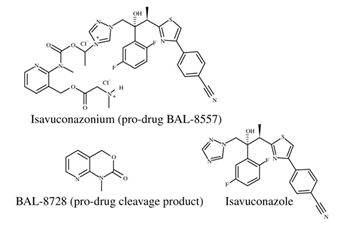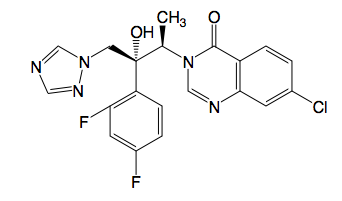These three new antifungals are amongst the series of new azoles designed to overcome the limitations of their predecessors. The following is a direct quote from Pasqualetto & Denning 2008:
“Although several new antifungal drugs have been licensed in the last 5 years, some patients remain difficult to treat. The main reasons for this include intrinsic or acquired antifungal resistance, organ dysfunction preventing the use of some agents and drug interactions. In addition, some drugs penetrate poorly into sanctuary sites including eye and urine, and others are associated with considerable adverse events. Here, we review the preclinical and clinical development progress with four new antifungal agents: isavuconazole, ravuconazole, albaconazole and aminocandin. Isavuconazole and ravuconazole are extremely similar, with a broad spectrum of activity, a very long half-life and large volume of distribution and good in vivo data supporting their efficacy in invasive aspergillosis and candidosis. Both compounds are in early Phase 3 development. Albaconazole has also shown very potent activity against species of Candida, Cryptococcus and Aspergillus. It was well tolerated and effective in women with vaginal candidosis. Aminocandin is an intravenous-only echinocandin with in vivo activity against Candida spp. and Aspergillus spp. Its extended half-life probably permits dosing less frequently than once a day. Overall these new antifungal agents in development offer extended half-lives, possibly reduced drug interaction profiles and good tolerance. Their antifungal spectrum is narrower than posaconazole and probably similar to voriconazole (isavuconazole and ravuconazole) and caspofungin (aminocandin). Licensure and determination of their place in clinical practice requires randomized clinical studies, which are or will be underway.”
Drug structures
 |
 |
 |
| Isavuconazole | Albaconazole | Ravuconazole |
David W. Denning FRCP FRCPath FIDSA FMedSci
Professor of Medicine and Medical Mycology
Director, National Aspergillosis Centre
Education and Research Centre
University Hospital of South Manchester (Wythenshawe Hospital)
Southmoor Road
Manchester M23 9LT UK
References:
Case histories:
